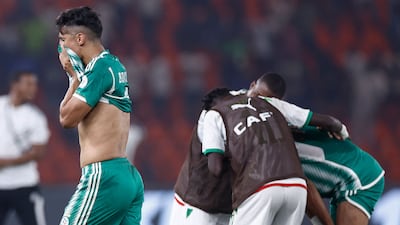At what point, a supporter of Algeria is entitled to ask, does familiarity become a flaw. As a speculative shot from distance ricocheted awkwardly in the Algerian penalty area on Monday night, a loose ball in search of a quick-witted, alert defender to clear it or an attacking player to pounce, minds went back to a previous night of heartbreak for Les Fennecs, the Desert Foxes.
The scenario, late in the first half of Algeria’s last group game at the Africa Cup of Nations against Mauritania, was enough of a copy of the portentous moment that swung the 2022 World Cup qualifying play-off to spread a shudder of dread.
The original version took place in the 124th minute of the second, home leg of the play-off against Cameroon. Algeria were 2-1 ahead on aggregate, all but ready to book their tickets to Qatar.
The ball then floated into their box. It dropped to nobody in particular, but the player with the sharpest focus was not an Algerian but Karl Toko Ekambi, there first and most alert, to spear in the shot that sent Cameroon to the World Cup finals instead.
Monday’s enterprising match-winner would be Mauritania’s captain, Yali Dellahi, a figure now with a permanent place in the sporting history of a nation who have always been at the back of the Maghrebi queue for glory. He was first to a loose ball in Bouake, Ivory Coast, turning a long-range drive that had ricocheted off Algeria’s Mohamed Amine Tougai past goalkeeper Anthony Mandrea.
Unlike against Cameroon in 2022, there was still over an hour to go in Bouake, still plenty of time for Algeria, the 2019 African champions, to hoist themselves up from the foot of Group D, to record their first victory of the tournament, or at least eke out a third draw in as many games and put themselves in the frame to progress to the knockout phase.
But Algeria fell back on the familiar. There was more deja vu. Again and again, there was the long ball approach that has been a default often during this frustrating campaign. Mauritania soaked those up and when a route behind Delalli’s back line was found, goalkeeper Babacar Niasse had the answers.
Like Delalli’s goal, Niasse’s whiplash reaction, to extend a long left arm and keep out Aissa Mandi, set off cheers from Nouakchott to Nema.
Algeria fell back on the very familiar when they brought Riyad Mahrez off the bench for the second half, his demotion from the starting line-up a reluctant commentary from manager Djamel Belmadi on the Al Ahli player’s ineffective tournament overall.
On came Islam Slimani, the 25-year-old centre-forward, with half-an-hour or so left. Into the fray came Youcef Belaili, another old ally, but no saviour on a night when it would be tempting to report that Algeria hit a nadir.
Tempting but inaccurate. Losing to neighbours Mauritania in a major tournament is a novel blow to pride, but in the context of this Cup of Nations, where the so-called ‘little teams’ stand up big and broad and the so-called giants are rendered meek, it is a lesser issue to the fact Algeria are going home at the first hurdle for the second time in a row.
As defending champions two years ago, they scored a single goal, won a single point and lost to Equatorial Guinea, Mahrez, Slimani and Belaili among the several left asking how on earth title-holders could fall so sharply.
This time around, they are more wearily perplexed. Belmadi, reviewing a second successive Afcon debacle, scarcely hides the knowledge that the huge bank of credit he built up by skilfully steering Algeria to the 2019 title, in Egypt, has been all but exhausted.
Belmadi reached out for alibis, like the penalties awarded against his team at bad moments, which allowed Angola, who topped the group, to retrieve a 1-1 draw, and Burkina Faso, who finished in second place, to regain the lead on matchday two, ahead of Baghdad Bounedjah’s stoppage time equaliser in the 2-2 draw.
Bounedjah has been Algeria’s only goalscorer at this Afcon. None of his three goals here have anything like the same sheen as souvenirs as the one that won the final in 2019.
“We feel stunned, sunk,” said Mandi, a 2019 veteran and captain on the night following the demotion of Mahrez to the bench. “It’s such a disappointment. We had prepared well, mentally and physically but it seemed like whatever we tried, it wasn’t going to work. I’m told we had 20 shots at goal in the tournament. We put everything into it.”
Mahrez, as the superstar, has been a magnet for shrill critiques, and if Belmadi’s dropping him showed that the coach’s loyalty had its limits, the theory that Mahrez’s shift in the direction of his club career – he left Manchester City with a treble to add to his many domestic medals from English football in the summer to move to Saudi Arabia – has blunted his edge is countered by his nine goals and seven assists in 20 games for Al Ahli.
Nor is their compelling evidence that the Saudi Pro League habitually softens its new recruits. The spine of Senegal’s team, from Sadio Mane to Kalidou Koulibaly to Edu Mendy, all moved to clubs there last year. And, in Ivory Coast, Senegal are looking like Afcon champions well capable of keeping their title. Belmadi’s Algeria never did.


